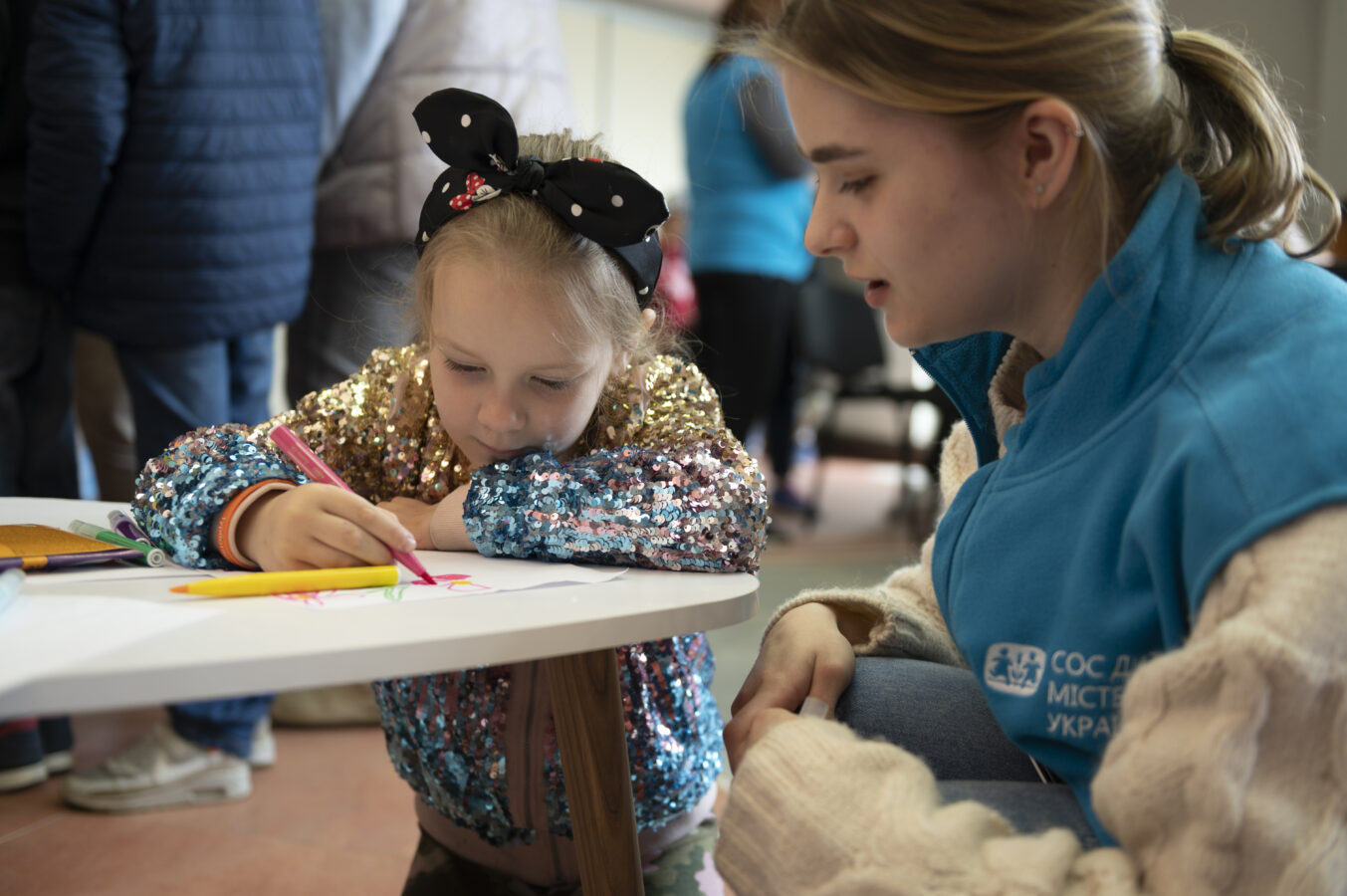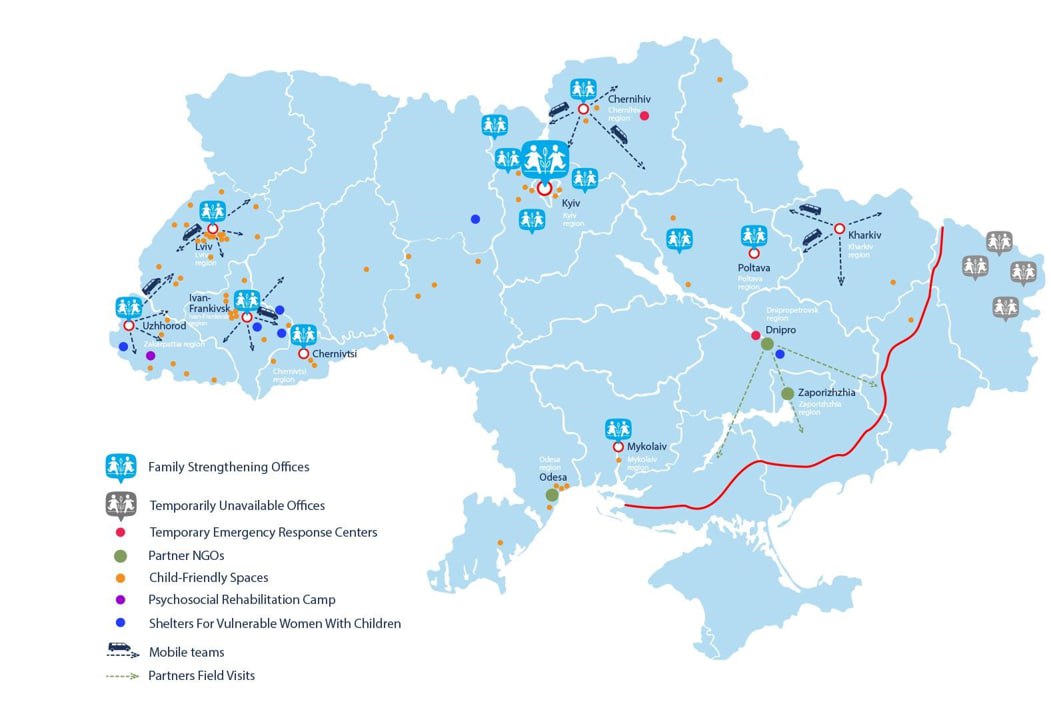SOS Children's Villages Ukraine
We ensure the right of every child to a loving family by supporting vulnerable families and creating a family environment for children who have lost it.
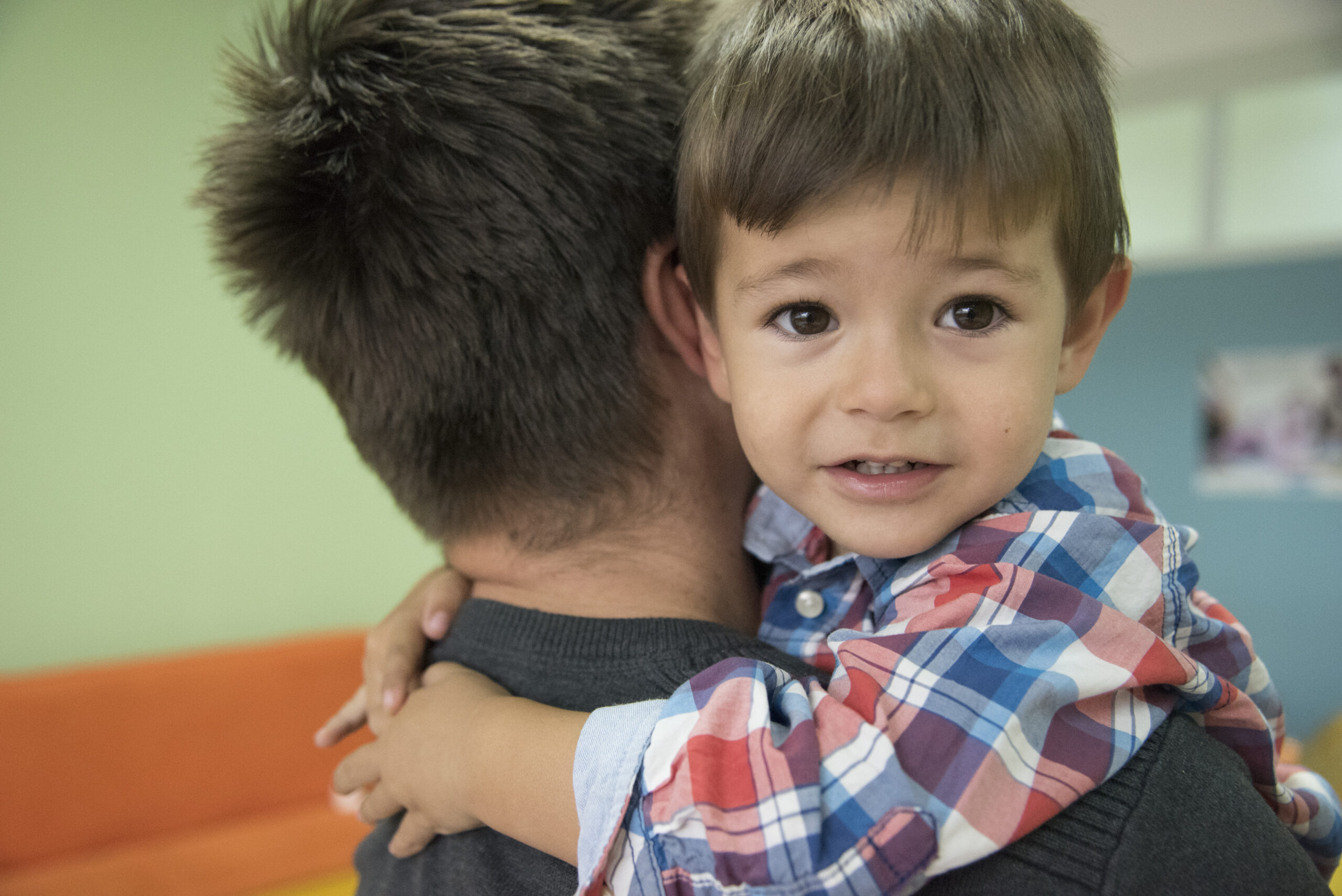
About Us
Since 2003, SOS Children’s Villages Ukraine has been working to make sure that no child grows up alone and unsupported. Our programmes strengthen families, keeping children with their parents; build loving families for children who need alternative care; prepare young people for successful adulthood. We empower communities to solve problems and build brighter futures.
Results of 20 years of our work
-
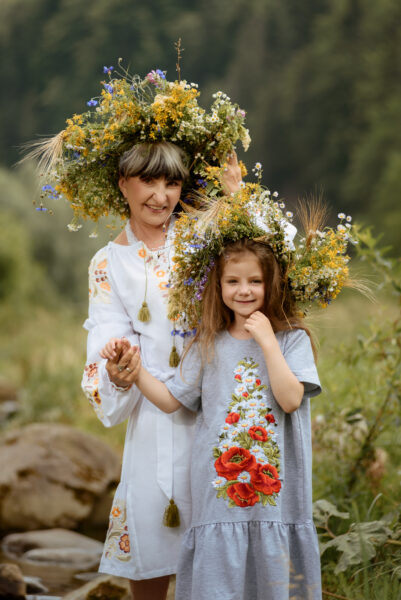 270+
270+children have new families
-
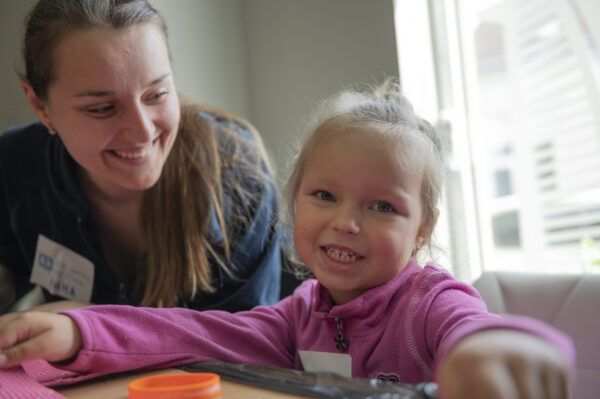 7 000+
7 000+children stay in their families of origin and receive adequate parental care
-
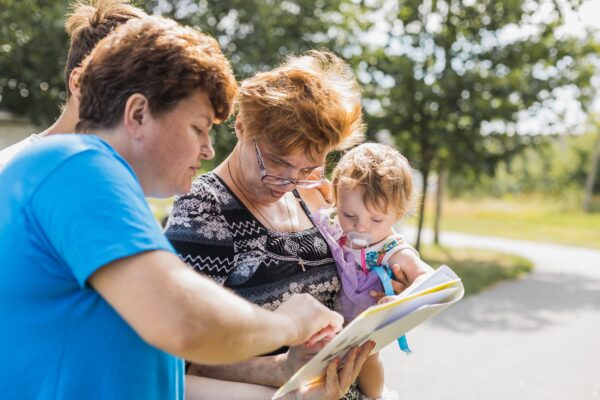 405 000+
405 000+Children affected by the war and their caregivers received appropriate support
What do we do
SOS Children’s Villages is the only organization in Ukraine that comprehensively addresses the issue of orphanhood, working on not only with consequences, but on prevention as well. If it is not possible to preserve biological family, we provide the full-fledged replacement, guided entirely by the interests of the child. We prepare children to independent life and support them after they leave care.
Activities
SOS Children's Villages Ukraine implementing comprehensive programmes to support vulnerable children and families, protect children’s rights. We operate in 9 regions of the country: Kyiv, Chernihiv, Poltava, Kharkiv, Mykolaiv, Lviv, Ivano-Frankivsk, Zakarpattia, Chernivtsi oblasts. Our work in Luhansk oblast is temporarily paused due to the occupation of this region.
We support the foster family care model for children deprived of parental care and orphans. Family-like care provides individualized care and promotes the development, education and health of each child and young person. Girls and boys of different ages live together in autonomous families with foster parents who bring up and support them. Every effort is made to keep biological siblings together. SOS Children’s Villages supports foster families with various services such as psychological, socio-pedagogical, medical, development of parental skills, self-help groups for foster parents, prevention of burn-out, material support, others. Foster care is integrated and supported in SOS Children’s Villages in various ways, including: 1) Setting up and running foster family networks, where foster families either live in their own homes or in a home provided by SOS Children’s Villages; 2) Working with partners, such as community-based organisations, to develop foster care solutions.
We work directly with families who are at risk of breaking down to ensure that they have the support they need to provide their children with these strong bonds. We use an approach called ‘case management’, and provide services based on an individual assessment of the family needs: from material support to the long-term psychotherapy, vocational training and inventory purchase for the self-employment. As a result, 70% of families left the Programme self-sufficient.
In our direct work with families and extended families, we offer a range of services, such as: livelihood support, parenting workshops, psychological counselling, family counselling to resolve issues, support in accessing social & health care services, providing parents with entrepreneurship and vocational training to help them become financially independent and create a stable home, access to education, including covering for tutoring and after-school help.
We work directly with youth to prepare them for this transition to independence through a special focus on youth empowerment. The organisation offers psychosocial support and provide guidance on education and career options, and encourage them to develop their individual interests and talents; vocational, qualifications, social skills training to increase their entrepreneurship prospects. We also focus on digital access and learning for young people, helping them to build skills for employability purposes. We work with partners, to set up employability and entrepreneurship initiatives; and with governments to improve aftercare provisions.
The Youth Center in Kyiv was founded in September 2018. More than 250 young people attend the Center monthly: 1) youth that live in SOS Children’s Village (14+); 2) youth that left care (18+); youth 14+ from crisis families; youth from the local community, as well as specialists that work in the child protection sphere.
We work with states and partners to help ensure that children and young people who have lost parental care or are at risk of losing it are protected, cared for and supported, ensuring that their rights are recognized and respected.
The UN Convention on the Rights of the Child, the UN Guidelines for the Alternative Care of Children, and other international frameworks such as the Sustainable Development Goals are the foundations of our programme and advocacy work. We stand up for children’s rights so they can live in dignity and thrive:
- advocate for the implementation of children’s rights; raise awareness of children’s rights and the challenges children are facing;
- partner with other leading organizations and stakeholders to promote children’s rights to achieve the greatest possible impact for children;
- share knowledge, shape discussions about improvement and innovation of alternative care.
We contribute to de-institutionalization by taking part in developing the National De-I Strategy to transform the institutional care system for family-like care for children deprived of parental care and influencing the development of the national legislation on children’s rights as a consistent member of the Interdepartmental Commission for Child Protection.
We launched an emergency programme to support children and families in our programmes, as well as the many thousands of children in foster care, kinship care, boarding schools and residential institutions.
Immediate support to children – and their families – in foster, kinship care and state residential institutions. Some 2879 children and their foster parents supported by the organisation have been relocated to various SOS Children’s Villages associations in Europe. Families were provided with food, supplies, psychosocial support.
Support of 18 local charitable organizations in various regions, including eastern and southern parts of Ukraine, to ensure evacuation, accommodation in temporary shelters, provision of humanitarian support, namely provision of necessary food kits, non-food goods, medicines, provision of psychological, legal and educational services for children and their caregivers affected by the war. Some of the implementing partners use mobile teams in their activities, which allows to provide assistance in two adjacent regions, on the frontline and de-occupied territories. In addition to their local centers partners covers the others territories.
We support internally displaced and affected by the war families with children in newly opened social centers around the country by providing: livelihood support (food, hygiene, etc. kits), psychological counselling, support in accessing social & healthcare services, providing parents with entrepreneurship and vocational training to help them renew their financial independence and create a stable “ground” in new places. We work with communities to strengthen existing social networks and structures. Our response is locally led and also aims to tackle gender norms and stigmas surrounding struggling or single-parent families wherever necessary.
In 2022-23 we provided cash assistance to foster families, kinship families, IPD’s families, families with children injured due to hostilities, adoptive families. Cash assistance for vulnerable and foster families with children was 2,200 UAH per family member for one month. Payments were made once a month for 3 months. With these funds, families could have chosen which needs were more urgent to cover – food, housing, non-food items, etc. Conditional cash was provided to families with injured children, families who adopted children in 2023.
We run 5 mobile teams. The teams work in places of compact residence of children and members of their IDP families, social and educational services centres, school and preschool institutions, facilities where child specialists carry out their activity. Psychologists also provide online counselling on individual requests from the program participants or referrals within the organization, from partners.
Group activities supporting children’s psycho-emotional well-being -14-day activities for children well-being in an environment that meets the needs of the children. The programme is aimed at children and young people between the ages of 6 and 17 who are potentially traumatised by violence or the effects of war. It includes 4 components: psychology, entertainment, sports and volunteering. The programme focuses on psychological support through various activities such as art therapy, eurythmy therapy, storytelling therapy and recreational activities.
Provision of comprehensive assistance to children who sustained injuries (damage to health) due to hostilities in Ukraine in 2022-2023 and their families in order to restore functioning, promote full and efficient participation in society on a par with others, and prevent, overcome, mitigate the repercussions of difficult life circumstances.
We support children and their caregivers with
1) assistive technologies — services designed to maintain or increase the current level of functional capacity and autonomy of people with special educational needs, thereby promoting their well-being;
2) socio-psychological rehabilitation – psychological counselling, psychological and pedagogical correction; assistance in obtaining educational services, labour adaptation, informing and/or consulting; representation of interests, development, formation and maintenance of social skills;
3) medical rehabilitation;
4) in-kind assistance.
Self-employment of caregivers is supported to provide sustainable livelihoods for the family and this way decrease its vulnerability and related to child protection risks. The second year of the full-scale invasion of the Russian Federation is gradually accustoming the population to learned helplessness – a phenomenon in which a person does not make efforts to improve his condition (does not try to avoid negative stimuli or receive positive ones), although he/she has the opportunity to do so. The population is getting used to humanitarian aid. Encouraging self-employment is an important strategy for ensuring sustainable financial stability of families and reducing dependence on aid. Financial stability provides parents with a sense of security and peace of mind. They can better manage stress and anxiety associated with the fear of financial hardship, allowing them to focus more on their children, their education and development. Financial stability in the family also reduces the risk of social problems in children, such as behavioral problems, deviant behavior and crime.
Our programme includes:
– training that focuses on the skills of writing a business plan, the basics of marketing and promotion, financial and legal issues of conducting business, personnel management;
– individual expert consulting support of each participant on their way to preparing a business plan; – practical sessions with the participation of experts and representatives of small and medium-sized enterprises and authorities;
– grants for the launch of the business and mentoring support of grantees.
We establish child-friendly spaces (CFS) in different parts of our country to provide children with a protected environment in which they can play, socialize, learn and express themselves. CFS are one of SOS Children’s Villages programmatic interventions to protect children from psychosocial distress and to help them continue learning and developing. At the same time, CFS are an important element of community capacity building and integration of IDPs and host communities. The equipment and activities in the CFS meet the needs of the host community and the affected population as much as possible, since the creation of each of the spaces was preceded by significant integration efforts to choose the optimal form and content of the space, namely, for the premises of social services and public institutions, the formats of mother and child rooms were chosen, where the maximum emphasis is placed on parents and guardians spending time together with children and free play, at the same time, space formats with a combination of creating opportunities for cognitive development and learning were chosen for educational and cultural institutions. They can help children develop a sense of security and self-esteem as CFS create a safe environment where parents and caregivers can leave their children while they find new income-generating activities or arrange life in new communities. These are places that help rebuild family, community and social structures. A significant part of the CFS creates opportunities for activities of representatives of different age groups, in particular self-organization and development of life skills of teenagers and communities of mutual help of parents and development of parenting skills.
How to help
For charitable donations in UAH or EUR
International charitable organization ‘Charitable Foundation ‘SOS Children’s
Villages’ Ukraine
ACCOUNT NAME: SOS Children Villages Ukraine
IBAN UA 56 300528 0000026003455050165
BANK NAME JSCB OTP Bank
BANK ADDRESS 43, Zhylyanska str., Kyiv, Ukraine
BIC / SWIFT OTPVUAUK
For charitable donations in USD
International charitable organization ‘Charitable Foundation ‘SOS Children’s
Villages’ Ukraine
IBAN UA 70 300528 0000026007455032996
BANK NAME JSCB OTP Bank
BANK ADDRESS 43, Zhylyanska str., Kyiv, Ukraine
BIC / SWIFT OTPVUAUK
Frequently Asked Question
The organization was founded in 1949 in response to the high number of children who had lost the care of their families during World War II. The focus in the early days was therefore on providing residential care – namely as an alternative to institutions and large-scale orphanages – in family-like settings, where children could grow up in a safe environment with strong relationships, a wider community, and a sense of belonging: the "children's village". In the seventy years since, the scope of our work has evolved a great deal and while residential care still forms part of our services, much of our efforts go towards strengthening families so that they can stay together and advocating for positive change in child-related policy and practice.
‘SOS’ stands for Societas Socialis. In 1949, Hermann Gmeiner and his supporters founded the Societas Socialis, a social club with the goal of raising funds for the care of orphaned children in Austria. A year later, the name was changed to SOS Children’s Villages.
If you want to contribute to SOS Children's Villages Ukraine, please use bank details mentioned on this page above or complete the donation form on https://sos-ukraine.org/yak-dopomogty/#payment. Donations via the website can only be made using a credit card (Visa or Master Card).
We value your support! A corporate partnership offers companies the opportunity to improve the lives of children, promote awareness of their corporate social responsibility, boost team spirit among staff and invest in projects of their choice. If you are interested in becoming a corporate partner, please write to Corporate partnership manager - Nataliia Risinko, [email protected]
On press inquiries, please write Head of Communications & FR - Ksenia Semeniak, [email protected]
To report a child safety concern or corrupt conduct, use our online whistle-blowing system or write to [email protected]
Key management policies and guidelines enable us to use our resources effectively, meet legal requirements, and learn from our experience so we can do the most good for children. Find out more about our policies and guidelines on SOS Children's Villages International website - https://www.sos-childrensvillages.org/transparency
Contacts
-
SOS Children's Villages Ukraine National office
Contact us
Please contact us if you have any additional questions or feedback.

